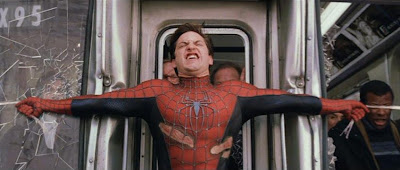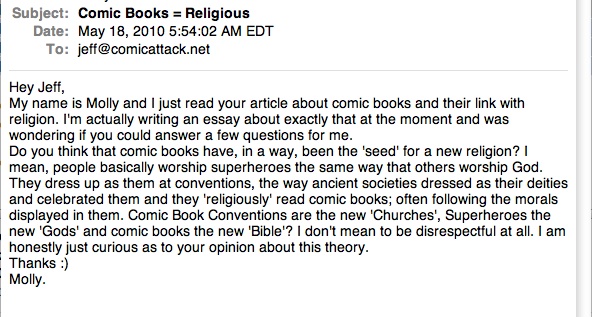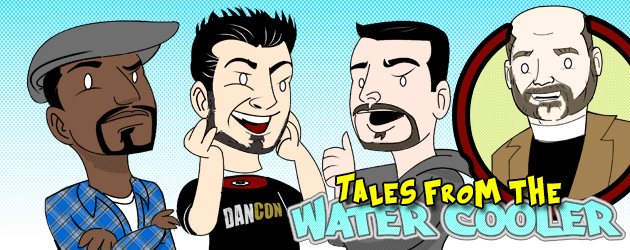Welcome to Comics Are My Religion, a look at theology through the lens of comic books.There are some basic ground rules about engaging in respectful dialogue about religion in this column. Be warned, if you haven’t read the comics discussed below, you might want to go read it and come back, as this column may contain spoilers!
I used to love letters-pages when they were prevalent in comics. Very few books include them these days. I’ve had a couple of letters printed over the years, one in the early days of Savage Dragon, and most recently in an issue of X-Factor. So in the spirit of the letters pages of old, in this month’s Comics Are My Religion, I wanted to answer a most interesting question by a ComicAttack.net reader:
 What a great question, right? Thank you, Molly, for taking the time to read my column and for writing in. I have quite a few thoughts on this:
What a great question, right? Thank you, Molly, for taking the time to read my column and for writing in. I have quite a few thoughts on this:
1. In 10,000 years, when our species has died out, and new lifeforms are digging up our remains, one might find some comics and think they are the ancient scrolled remains of a dead religion. Much like our current findings of sequential art in caves which told fantastic stories of old (hieroglyphics and the like). However, pretty pictures do not a religion make.
2. I would akin the love of comics like I would any hobby or passion a person has. Folks have joked that on Sunday mornings, more people are gathered around TVs and stadiums watching the new religion of football than in churches. Sports and the arts all have ways of drawing us in, teaching us things, causing us to cheer in excitement, be solemn in times of woe, and bringing us together with like-minded individuals. This parallel is more like a historical one. As humans, we tend to become fascinated with something to the point where we start dressing like heroes, and celebrating the hobby to an almost-fanatical point. This reminds me more of the classic religions of the Roman and Greek mythology. That mythology had religious and social implications, however, that I don’t think we’ve carried into our love of comics. That said, superheroes certainly are our new cultural pantheon, but I don’t think we’ve reached the point of worship of them yet. Once people start killing themselves as sacrifices to Galactus, then we might need to rethink this.
3. There is no orderly set of beliefs found uniform about theology or philosophy in comic books. The thoughts and ideas are as varied as there are creators and superheroes. Most of the religion found in comics, in my opinion, are based around the great world religions that already exist, and most of that is really misconceptions about those religions. Each creator puts in his or her religious bias as commentary on existing thought. I really see no new ideas or religious thoughts sprouting from the panels of the page.
4. All of this said, one thing that comic books and religions share is a surrounding community for people to belong. One thing that makes Cons so great is that you have people who find themselves with people who share a love of the medium gathered together. The reason comic book reading has gotten so popular these days is because the Internet has provided a viable community for us to discuss, share, disagree, and speculate about our favorite books and stories, much in the same way a church might do. One thing that drew me to comics was discovering there were “nerds” like me out there who were as fascinated as I was. This brought me a great deal of comfort. Luckily, I found an even greater community of acceptance in the church. So the only parallel really that I see is that both religion and comics provide a community for people to belong to.
5. For a while now, I have been contemplating the similarities between declining comic book shops and declining churches. Both are usually dark, musty, and old. Both have “gatekeepers” who are stereotypically cynical, rude, and elitist. Both make it hard to enjoy the very thing they promote. Both are filled with old books. Neither advertise for new people. However, the reverse is also true. Comic book shops and churches that are doing well and growing are friendly, well-kept, full of light, accessible to new readers, and even do some risky things in order to attract people.

6. I certainly think there are commonalities in what draws us to religion and comic books. I think everyone has the craving for knowing that something bigger than themselves is “out there.” Even atheists I speak to acknowledge that there is some greater power (maybe not God, maybe something scientifically based, a “gnosis” or knowledge that is intangible, but present). Thus, we are fascinated with such fantastic and super-natural ideas. Both religion and comic books are the icons (or windows) into the holy, the sacred, and the fantastic. They help us to discover that there is more than our banal existence. It might all be imagination, but imagination can be quite comforting in a world full of pain, suffering, hatred, lack of compassion, and fear. Comics and religion provide us a window into “another world” not where we retreat and escape, but where we learn to reformulate our worldview. They both give us hope.
 7. Comic books and their heroes become for us parables for life. While Superman turning the world backwards and changing time is completely unrealistic and too fantastic to conceive, it tells the story of the lengths one will go to make things right for the justice of the world. For me personally, it’s the parable of the Marvel heroes especially that speak to me and teach me about my own life. If you live selfishly and look out only for yourself, then you have to live with the consequences (Spider-Man). However, if you have been given power, you must use it responsibly. We all get angry, and let our “hulks” out, but can we control them? These parables are what drew me to comics as a child. They don’t have to be literally or historically true in order to contain a “more-than-literal” truth. I see Scripture in the same way.
7. Comic books and their heroes become for us parables for life. While Superman turning the world backwards and changing time is completely unrealistic and too fantastic to conceive, it tells the story of the lengths one will go to make things right for the justice of the world. For me personally, it’s the parable of the Marvel heroes especially that speak to me and teach me about my own life. If you live selfishly and look out only for yourself, then you have to live with the consequences (Spider-Man). However, if you have been given power, you must use it responsibly. We all get angry, and let our “hulks” out, but can we control them? These parables are what drew me to comics as a child. They don’t have to be literally or historically true in order to contain a “more-than-literal” truth. I see Scripture in the same way.
So there are quite a few parallels to comics and religion. Can one then create a religion out of comics? Sure, if they spend time creating the doctrine and organize it to be such, just like they could anything. Do I think people are doing that, subconsciously? Not in a systematic way. Therefore, I wouldn’t go so far as to say comic books are a new religion, but comics certainly contain similarities to religion.
What do the rest of you think? Could we deify Batman or Captain America and use their stories as our Scripture? Could Jack Kirby or Geoff Johns become the new prophets? Will Wednesdays become the new Sundays? Are comics your religion?
Jeff Jackson
jeff@comicattack.net



To answer your final question, the roots are definitely there for someone to make comics into a religion. Heck, I’m surprised we haven’t seen cult groups popping up, dedicated to each individual Lantern color/emotion!
I love point #5. Very well said.
The comic book retailer needs to fix that if they hope to survive the next decade of the digital age!
“They don’t have to be literally or historically true in order to contain a “more-than-literal” truth. I see Scripture in the same way.”
Exactly.
Why not? People have turned their fandom of The Melancholy of Haruhi Suzumiya into a sort of religion. They actually call it Haruhiism, which you worship in the Church of Haruhi. It’s fake of course…it’s mostly obsessive fandom.
And I’m pretty sure people have taken religions from popular books and movies and “worshiped” through them (like the Force in Star Wars).
You might be interested in an anime called Serial Experiments Lain, where people worship a god that exists in the “Wired” (the Internet). That’s kind of unrelated to this, but just something I remembered.
Pingback: Tweets that mention Comics Are My Religion: A New Religion? -- Topsy.com
After the bomb, when all of our history and culture become orally passed down, comic book stories certainly have a chance at knocking the old guard off their mantles. Most superheroes represent the Pantheon of Gods in some way, and some even directly reflect the Big Guns (Superman is compared to Jesus so often that it’s become redundant). It’s not too far fetched.
It reminds me of Futurama where they misinterpret their artifacts. I hope we don’t do the same with ours nor have it happen to us! Lol
Great idea with the e-mail Jeff. Very good column as well. You are so right about the dark, old musty vs. the new bright, well kept. I’ve been to both. lol
You do realize what you said in point #3 is almost exactly what can be said about the Bible, right? Just replace “superheroes” with “gods” and “comics” with “the Bible”.
I don’t think you give the thematic underpinnings of comics enough credit. How many times have comic afficionados debated about if this story or that story is “canon”? How many times have comic purists debated about how this character would NEVER do this thing or that thing? How many times has there been a discrepency (sp?) about how Spider-Man’s webbing works or how much Superman can lift based on issues X,Y, or Z?
The way comic book universes have been built, I think, is strikingly similar to how religions are created. Joseph Campbell said that America doesn’t have its own mythology. I humbly disagree. Comic books (along with jazz, is a pure American invention) are building that mythology one issue at a time.
Yes, I see your point about #3, but while there are varying theologies that stem from Christian theology, most of these are systematic. I have yet to see a systematic theology from comics. It’s not that it can’t be done, it just hasn’t been done yet.
I agree completely with you about the Joseph Campbell thing. But where does mythology stop and religion begin? Are the two interchangeable?
Well, to me, it’s ALL mythology. But that’s a discussion for another time.
As for the rest, I’m not quite clear what you mean by “systematic”. My only guess is you mean how one structure was built using the guide of the structure before it, and so forth. (If I’m a little off base, please feel free to smack me down).
But as for the theology of comics, I think I can some up Marvel and DC (which, let’s be honest, are the only companies with the amount and variety of material to come close to forming their own “theology” to begin with).
Marvel: Dead is dead.
DC: It’s ALL true.
Seeya.
By ‘systematic,’ I mean an orderly account of faith and theology. In Christianity, systematic theology is the entire developed structure of Scripture, doctrine, and philosophy. No one has yet done this with comics, although your summaries are a stab in the right direction.
Although I don’t think Marvel = Dead is Dead, but “Dead is Dead…until it’s alive again.”
Yes, even in Marvel, characters do come back. But NOT from the dead. That’s one of the differences between Marvel and DC.
In Marvel, if a character is “killed” off, if some writer wants to bring the character back they have to find a way, by hook or by crook, to make it that the character was never dead to begin with.
In DC, you can be dead and just come back. I mean DEAD dead. I mean in the ways that people think of someone being dead….THAT dead. Ooooooohhh so dead. Green Arrow? Dead. Green Lantern? Dead. But they’re still around, right? And don’t get me started on what they did with Superman a while back. (And I haven’t followed DC in a while. I bet there are TONS more examples.) In DC, there IS no final threshold….you NEVER leave the game.
Very good observation. I’ve never noticed that distinction, but then again I don’t read much DC.